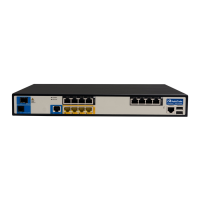Reference Guide 770 Document #: LTRT-17939
Mediant MSBR
Command Description
Select an address or a name from the list to apply the rule on the
corresponding host, or Any to apply the rule on all the device's LAN
hosts.
Select traffic by IP addresses and ports, in one of the following
formats:
• any - Defines all traffic.
host a.b.c.d - Defines Traffic to/from single host, specified by the
IP address. When an access list (see configure data > access-list)
is created for management using the protocols SNMP, Telnet, SSH
or CWMP, it is possible to use a DNS name instead of an IP
address. In this case, an FQDN can be configured for the host.
local- Defines the Local IP address.
a.b.c.d - Traffic to/from a subnet, specified by an IP address and a
mask (e.g., 0.0.255.255).
Note:
The eq and range parameters are only used if <protocol> is set to
"tcp" or "udp".
eq <port> - Defines traffic to/from a single port.
range <start> <end> - Defines traffic to/from multiple ports,
specified by range.
If the port selector is not defined, the rule will match all ports.
dscp options The following options can be used:
dscp - Match by Differentiated Services Code Point
value and mask. Defines the packets by matching the
Differentiated Services Code Point (DSCP) field of
the IP header.
The format of this option is:
dscp <c> mask <m>
The packet's DSCP value is compared to <c>
mask <m>
(both must be specified in hexadecimal).
For example: dscp 10 mask 3F
established -Accepts connections.
stateless - Accepts packets.
log - Logs matches.
precedence - Matches by IP Precedence value (0 high
– 7 low)
Note: "precedence" is applicable to MSBR devices –
Mediant 500, Mediant 500L and Mediant 800.
options
Defines one or more of the following options:
stateless - Traffic matching is stateless, i.e., it does not keep
track of the connection state.
log - Traffic matching this rule will be logged.
- Accepts connection

